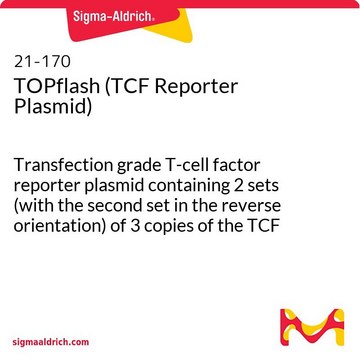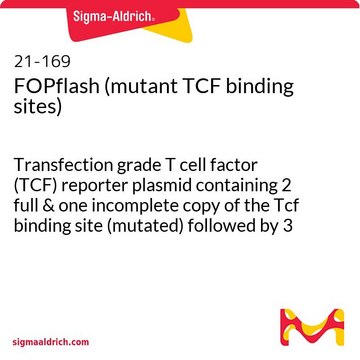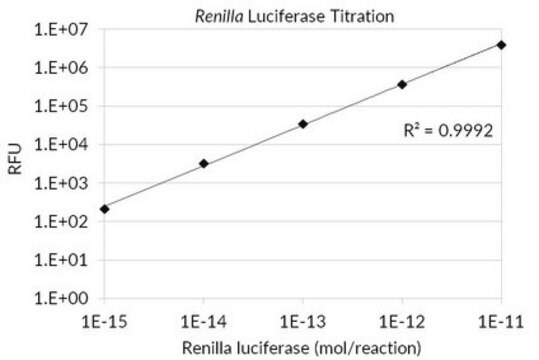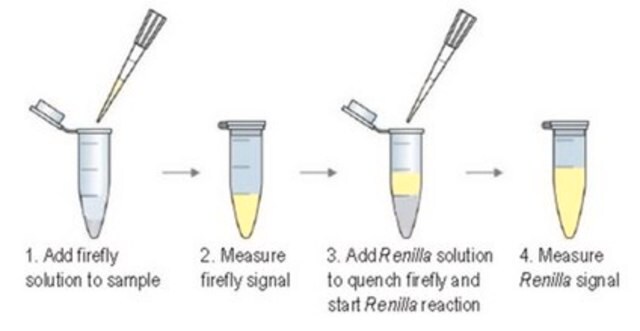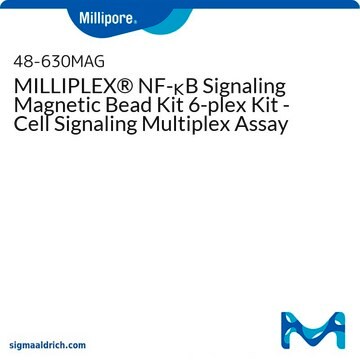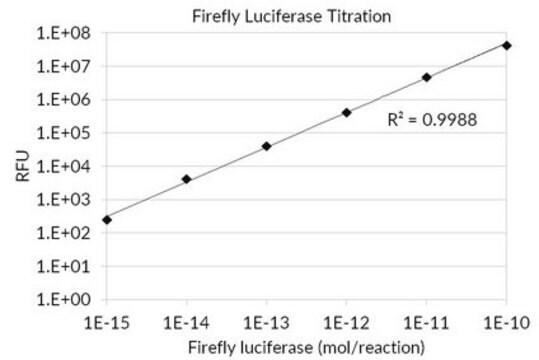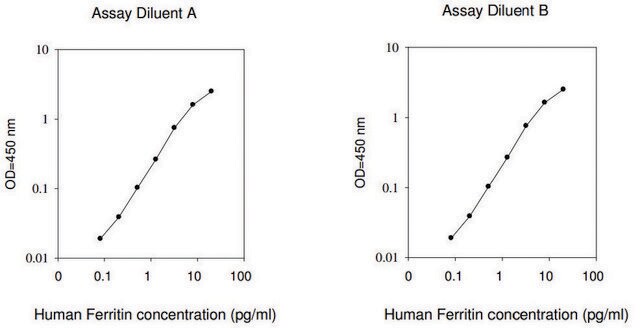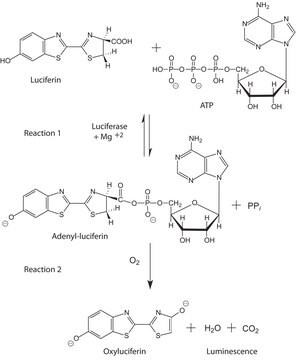17-285
TCF Reporter Plasmid Kit
Set of transfection grade T cell factor (TCF) reporter plasmids for use in TOPFlash and FOPFlash wnt/b-catenin activity assays.
Synonym(s):
TOPFlash/FOPFlash, TOPFlash plasmid, FOPFlash plasmid
Sign Into View Organizational & Contract Pricing
All Photos(1)
About This Item
UNSPSC Code:
12161503
eCl@ss:
32161000
NACRES:
NA.51
Recommended Products
Quality Level
manufacturer/tradename
Upstate®
technique(s)
transfection: suitable
NCBI accession no.
application(s)
genomic analysis
shipped in
dry ice
General description
FOPflash: Transfection grade T cell factor (TCF) reporter plasmid containing two full and one incomplete copy of the TCF binding site (mutated) followed by three copies in the reverse orientation, upstream of the Thymidine Kinase (TK) minimal promoter and Luciferase open reading frame. This plasmid serves as a negative control to TOPflash which contains wild type TCF binding sites.
TOPflash: Transfection grade T-cell factor (TCF) reporter plasmid containing two sets (with the second set in the reverse orientation) of three copies of the TCF binding site (wild type) upstream of the Thymidine Kinase (TK) minimal promoter and Luciferase open reading frame. FOPflash containing mutated TCF binding sites is also available as a negative control.
TOPflash: Transfection grade T-cell factor (TCF) reporter plasmid containing two sets (with the second set in the reverse orientation) of three copies of the TCF binding site (wild type) upstream of the Thymidine Kinase (TK) minimal promoter and Luciferase open reading frame. FOPflash containing mutated TCF binding sites is also available as a negative control.
The Wnt family encodes secreted glycoproteins implicated in cell growth regulation, cell fate determination, organogenesis and oncogenesis. Inferred from genetic analysis of wingless (wg) signaling in Drosophila, in mammalian cells, Wnts signal through the Frizzled family of receptors, to Dishevelled. Dishevelled down regulates glycogen synthase kinase-3ß (GSK-3ß) activity. This results in the stabilization and accumulation of cytosolic ß-catenin, a GSK-3ß substrate, which when phosphorylated by GSK-3ß, is targeted for ubiquitin-mediated proteolysis. ß-catenin then translocates to the nucleus, where in complexes with members of the Tcf/LEF family of transcription regulators, activates transcription of Tcf-responsive genes. This Tcf-reporter plasmid, along with FOPFLASH (Cat. # 21-169) enables quantitation of Wnt/Wg signaling in cells transfected with these constructs.
Application
Set of transfection grade T cell factor (TCF) reporter plasmids for use in TOPFlash and FOPFlash wnt/b-catenin activity assays.
Components
FOPflash (mutant TCF binding sites) (Cat.# 21-169)
TOPflash (TCF Reporter Plasmid) (Cat.# 21-170)
TOPflash (TCF Reporter Plasmid) (Cat.# 21-170)
Quality
Routinely evaluated by DNA Sequence Analysis to confirm the identity of TCF binding sites.
Physical form
FOPflash, Catalog # 21-169, Lot # 30860, 5.5 kb. 5 μg affinity purified DNA eluted and aseptically packaged in 50 μL of 10 mM Tris-HCl, pH 8.0, 1 mM EDTA. Frozen solution.
TOPflash, Catalog # 21-170, Lot # 27752, 5.5 kb. 5 μg affinity purified DNA eluted and aseptically packaged in 50 μL of 10 mM Tris-HCl, pH 8.0, 1 mM EDTA. Frozen solution.
TOPflash, Catalog # 21-170, Lot # 27752, 5.5 kb. 5 μg affinity purified DNA eluted and aseptically packaged in 50 μL of 10 mM Tris-HCl, pH 8.0, 1 mM EDTA. Frozen solution.
Storage and Stability
Stable for 2 years at -20°C from date of shipment. For maximum recovery of product, centrifuge the original vials after thawing and prior to removing the cap.
Legal Information
UPSTATE is a registered trademark of Merck KGaA, Darmstadt, Germany
Disclaimer
Unless otherwise stated in our catalog or other company documentation accompanying the product(s), our products are intended for research use only and are not to be used for any other purpose, which includes but is not limited to, unauthorized commercial uses, in vitro diagnostic uses, ex vivo or in vivo therapeutic uses or any type of consumption or application to humans or animals.
Storage Class Code
10 - Combustible liquids
Certificates of Analysis (COA)
Search for Certificates of Analysis (COA) by entering the products Lot/Batch Number. Lot and Batch Numbers can be found on a product’s label following the words ‘Lot’ or ‘Batch’.
Already Own This Product?
Find documentation for the products that you have recently purchased in the Document Library.
Kazumi Take et al.
Scientific reports, 7(1), 7326-7326 (2017-08-06)
CDK5 Regulatory Subunit-Associated Protein 1-like 1 (CDKAL1) was identified as a susceptibility gene for type 2 diabetes and body mass index in genome-wide association studies. Although it was reported that CDKAL1 is a methylthiotransferase essential for tRNALys(UUU) and faithful translation
F J Staal et al.
International immunology, 11(3), 317-323 (1999-04-30)
Beta-catenin is the vertebrate homolog of the Drosophila segment polarity gene Armadillo and plays roles in both cell-cell adhesion and transduction of the Wnt signaling cascade. Recently, members of the Lef/Tcf transcription factor family have been identified as protein partners
M P Coghlan et al.
Chemistry & biology, 7(10), 793-803 (2000-10-18)
Glycogen synthase kinase-3 (GSK-3) is a serine/threonine protein kinase, the activity of which is inhibited by a variety of extracellular stimuli including insulin, growth factors, cell specification factors and cell adhesion. Consequently, inhibition of GSK-3 activity has been proposed to
J Roose et al.
Nature, 395(6702), 608-612 (1998-10-23)
Tcf/Lef transcription factors mediate signalling from Wingless/Wnt proteins by recruiting Armadillo/beta-catenin as a transcriptional co-activator. However, studies of Drosophila, Xenopus and Caenorhabditis elegans have indicated that Tcf factors may also be transcriptional repressors. Here we show that Tcf factors physically
M van de Wetering et al.
Cell, 88(6), 789-799 (1997-03-21)
The vertebrate transcription factors TCF (T cell factor) and LEF (lymphocyte enhancer binding factor) interact with beta-catenin and are hypothesized to mediate Wingless/Wnt signaling. We have cloned a maternally expressed Drosophila TCF family member, dTCF. dTCF binds a canonical TCF
Our team of scientists has experience in all areas of research including Life Science, Material Science, Chemical Synthesis, Chromatography, Analytical and many others.
Contact Technical Service